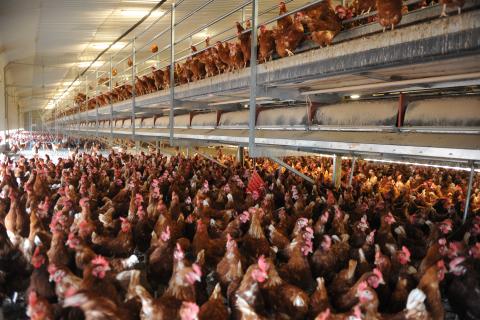An anaerobic digestion (AD) plant, matched in size to a farm’s needs, can allow Welsh poultry units to take control of their energy costs and benefit manure management.
Wales has seen a big expansion in poultry production in recent years, with many new units in mid Wales and along the Marches border.
Each unit can produce hundreds of tonnes of litter a year, but not all of this can be spread on land for risk of phosphorous and nitrogen pollution.
During a Farming Connect event in Newtown, poultry farmers were told that small-scale AD plants offered a solution in their systems, in which energy is typically the second largest cost.
Poultry manure is one of the most gas productive manures available, yielding over 100cu m of biogas per tonne, compared with 20-50cu m/t for cattle slurries/manures.
Chris Morris, who has developed AD technology able to deal with the high concentration of grit in poultry manure, said poultry farmers are typically paid £10/tonne for manure as a fertiliser, but it is very expensive to transport around the country.
If it can be concentrated by a factor of 50, through an AD plant, it becomes much more valuable, he suggested.
At the end of the AD process, there is a significant tonnage of digestate which can be applied to land as a fertiliser.
“Digested poultry manure is an extremely effective fertiliser. The digestion process kills most of the weed seeds and salmonella and E.coli,’’ said Mr Morris, of Wrexham-based Fre-energy.
Run off from manufactured fertiliser is significant. “From digestate it is significantly less, liquid digestate can grow as much crop as manufactured nitrogen, potash and phosphate,’’ said Mr Morris.
But a challenge to the future of AD is diminishing feed-in tariffs – 5p kW/hour compared to previous payments of 14p kW/hour.
“The Renewal Heat Incentive is also dropping away,’’ said Mr Morris.
“The figures for 50-60 kW plants are difficult to stack up because of the energy they require to operate and the legislative overheads, therefore operating an AD plant is subject to government support and legislation.
Poultry manure has a high concentration of nitrogen which can kill off the bacteria within the AD plant so it needs to be mixed with other manures.
But technology is progressing and Mr Morris said one of the 300kW plants he had established is operating on 85% chicken manure, with the balance coming from cattle slurry.
Free range egg laying system produce large amounts of grit therefore the ratio should be no more than 60% chicken manure, he advised. “The ideal mix is with dairy cattle slurry followed by beef cattle then pig.’’
Sedimentation will build up in an AD system if chicken manure is used or slurry from animals bedded on sand or ash.
But digesters are now available that have a mechanism to remove that grit.
Denise Nicholls, of Fre-energy, said farmers should view AD technology as an asset to their businesses but she warned that they were not a “get rich quick’’ scheme.
“It is a long-term investment for farming businesses, it should be viewed with next generation in mind.
“It gives you an opportunity for farmers to have an alternative income other than just from the food industry which is very volatile.’’
Importantly, AD offered a closed loop nutrient cycle, she added.
“Every farming business should be given opportunity to incorporate one within their business because it will reduce runoff in watercourses and reduce the need to import manufactured fertiliser. The digestate can be put back onto land as nutrients and minerals.’’
Jodie Roberts, Pigs and Poultry Technical Officer at Farming Connect, said the litter produced by poultry units presents a significant environmental challenge.
“AD plants recycle litter to produce a good quality fertiliser therefore the technology can allow poultry units to improve their environmental footprint and provide additional income opportunities,’’ she said.
For more information on utilizing digest as fertilizer, please see the results from a Farming Connect Demonstration Farm project on Newton Farm comparing digest to synthetic fertilizer.

